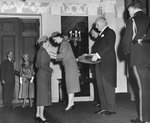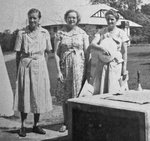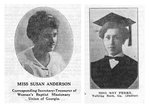


In the fifty years following the departure of Lottie Moon from Cartersville, Georgia to the mission field of North China in 1873, twenty-five single ladies from Georgia alone would be appointed as foreign missionaries under the SBC Foreign Mission Board. They would serve as educators, women’s workers (evangelist), in health care, and in other areas of missionary service, far from home. They lived with the constant fear of disease, political unrest, war, prejudice, and financial uncertainty. They also often lived with loneliness and isolation as their companions. This generation of female missionaries' work has been largely overlooked, but the sacrificial and heroic labors of these women in the name of Jesus should be remembered.
Two of these missionaries were from small communities in north Georgia. They both served for nearly forty years as educators at a girls’ boarding school at Idi Aba, Abeokuta, Nigeria. Their story is a reflection of the lives of many others of their generation who surrendered to the call of missions.
Minnie "Susan" Anderson was born in Turnersville, Georgia in 1892. She was the second of five children, and the only daughter. Her father was a carpenter. She became a Christian at age 16, and following high school she attended the WMU Training School in Louisville, Kentucky. This school, which opened in 1907, became the training ground for many Southern Baptist women seeking to serve in Christian ministry.
After graduating in 1915 she took a position as administrative assistant to the pastor of the First Baptist Church of Charlotte, N.C. While there, she applied with the Foreign Mission Board to serve as a foreign missionary in Nigeria. Once accepted, travel to the field was delayed because of World War I. She returned to Georgia and accepted the position of executive director of the Georgia WMU in the fall of 1918. She was only in this position for four months before being informed that travel restrictions had been lifted.
In her brief time as executive director she proved to be an effective communicator and in the long term an inspiration to the women of Georgia who followed and supported her work. After spending several months in language school in Baltimore, she and three other missionaries sailed from New York City in 1920.
She was to spend her first year in Nigeria teaching at a small boarding school that only could accommodate 16 girls, while continuing to study the Yoruba language. After that, she was to begin working as a WMU Field worker across the country. At the end of the first year, she found that teaching had become her new calling and settled into a ministry that would span four decades.
Susan was remembered for her sense of humor and adventure. She was described as, “a woman of genuine culture and charm ... deeply spiritual and wholly consecrated to her task. She has a sane and wholesome outlook on life and is highly endowed with a discerning sense of wit and humor that radiates good cheer and comradeship wherever she goes.”
In 1942 she wrote a book titled, “So This is Africa,” sharing the nature of mission work in Nigeria and much of her own story. She described the culture, religion and spiritual needs of the people of Nigeria. and the fears she faced and obstacles encountered. Even though she was a teacher, she was also a lifelong learner, eager to understand the people God had sent her to serve.
The following account from her book illustrates this point. One day she explained she was literally called to fill in at the last-minute teaching a Bible class. The assigned lesson was from Isaiah 44 on the “Folly of Idolatry.” Knowing that many of her students had probably worshiped idols she asked a question, about their personal experiences.
She wrote, “When I questioned them, I was surprised to find that the majority of them had been idol worshipers. I tried to get them to tell what help they had expected to receive from the worship of a piece of wood or stone. ‘Girls,’ I said, ‘did you really believe that such a lifeless thing could do anything for you?’ Most of the answers revealed that they had worshiped certain idols simply because their parents had done so ... To a few it was a matter of laughter and jest: but toward the close of the discussion, one of the finest Christian girls stood and with deep earnestness said, ‘Please, Ma, I do not think the girls should laugh about the worship of idols. Many who worship an idol are trying to find something that will help them to discover a power which is greater than their own. I knew the idol I worshiped could not see and could not hear, but somehow I hoped that my worship of it would bring me aid from One who could help me. Now that I am a Christian, I know that I was trying to make that idol do for me just what Christ wants to do for me—bring me in touch with the great God, and that is the reason why I want to go and tell every woman I see worshiping an idol, that I know the One who she is needing and seeking—Jesus.’ Since hearing those words,” Anderson continued, “I have looked upon idol worshipers with more understanding.”
For more than forty years she faithfully taught, guided and shared Jesus with hundreds of students in her classroom and many more on Sundays and other days as they gathered children in the nearby villages to teach Bible lessons. The letters she sent home and other published pieces helped focus prayer and financial support for the people of Nigeria.
Following her retirement, she wrote a second book which was published in 1966. Titled, “May Perry of Africa,” it was a biography of her fellow north Georgia missionary and colleague at the boarding school for nearly 40 years, May Perry. Susan Anderson passed away in 1967 at the age of 75.
May Perry, also born in 1892, was raised in the small North Georgia community of Talking Rock. She made her profession of faith at age 13. After high school, she wanted to attend college in order to become a teacher. A family member made it financially possible for her to begin Georgia State Teachers College for Women in Milledgeville. Tragically, near the end of her first semester, her mother unexpectedly passed away forcing her to return home to help care for the family. It would have been easy to give up on her dreams of college, but one of her former teachers saw her potential and encouraged her “not to give up!” She was able to return to college and graduated in the spring of 1912.
After teaching in public schools for six years she felt God calling her to the field of Christian education. She had saved some of her meager teacher’s salary through the years but still was not in a position financially to continue her education. The WMU of Georgia became aware of those needs and offered her a scholarship to attend the WMU Training School in Kentucky. During the second of a three-year program, she felt God calling her to become a missionary educator in Nigeria. She applied and was appointed by the SBC mission board, sailing to Africa following her graduation in early 1921.
Upon her arrival in Nigeria one of the older missionaries commented on her appearance to another stating, “That little one wont’ be long doing missionary work in this climate ... too frail.” About a third of the SBC missionaries to Nigeria since the inception of the work 75 years earlier had died from yellow fever. It did not look like a promising start to a new missionary career.
May was noted for her love of learning, her ability to sew and fondly by her fellow missionaries and students for not having any mechanical inclinations or cooking skills. Most missionaries in the 1920s traveled by bicycle, but she could never master the skill. The WMU of Georgia gave her a Model A, but the other missionaries had to do the driving. Once when entertaining guests she had to have someone else remove the tops from soft drinks because she couldn’t. It was said, if she was to help build something the nail most likely to be hit by her hammer was her fingernail. She could not cook, and when it came her turn to cook, she found someone else, often a student, to do it. Her biography stated it was not because she was lazy, but because she didn’t want the other missionaries to have to suffer by eating her cooking.
While she was not noted for certain mechanical or domestic skills, she was noted as an excellent educator, who had compassion for her students and the vision and administrative skills to expand the operations of the school.
In 1924 the school received $35,000 from the “75 Million Campaign” to build new facilities. The newly expanded campus had new classrooms, a chapel, and dormitory space enlarging the capacity from 16 to 100 girls. In 1927 the longtime administrator of the school retired and May Perry was appointed as the new principal. Under her leadership, the school continued to grow and by the time of her retirement 30 years later could accommodate 350 girls.
Learning about the high mortality rate of women and their babies during childbirth, she tackled this problem. She began reading all she could find on the subject and consulted others. Then she began teaching the school students and other women how to assist during the labor and delivery process. This saved the lives of many women and children across the region.
As she was nearing retirement an urgent message was received from Georgia concerning her sister’s health. When a reply telegram was sent asking if she should return immediately or if she could delay, the response was to return immediately. She had a day and a half to pack up 39 years’ worth of items and memories and say goodbye to as many as possible.
Knowing the impact she had made in the lives of thousands of students, the mission had the news broadcast on radio and television that she would be departing on a certain flight the following day. They instructed those who came to see her off that it was to be a time of “no tears.” Timing her arrival to be early and much to her surprise, the airport terminal and surrounding grounds were filled with well-wishers to see her off. They sang choruses they had been taught in school, laughed and shared memories until the appointed time for her to walk to the plane to depart. Susan Anderson describing the event wrote that May Perry walked to the plane, “but never looked back.”
The frail missionary who “won’t be long” was leaving behind a rich legacy of lives transformed by the gospel and enriched through education. In recognition of her work in raising the standards for women’s education in Nigeria, laying the groundwork for the first women’s college in the nation and her work improving the health and well-being of women, she was invited to the British Embassy in Washington, D.C. There, Queen Elizabeth II presented her with the honorary title of the Order of the British Empire.
Not all missionaries were authors like Susan Anderson, and May Perry is one of only two Southern Baptist missionaries to have become an honorary member of the Order of the British Empire. It is because of this we know more about their lives. On the other hand, it does not diminish the work of the many other women who toiled in other fields, often in obscurity. They were part of a generation who heeded the call of missions, a call that still resonates throughout the church today.
__
Charles Jones is a Southern Baptist historian, retired pastor, and newspaper columnist.